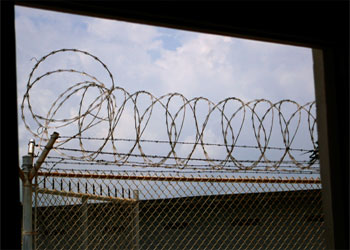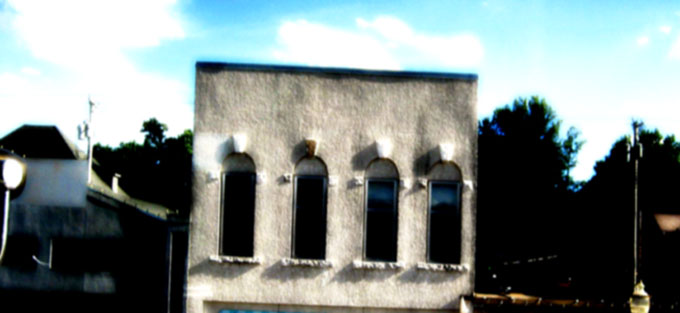by Emily Ewing
As I ended my third year of college in Decorah, Iowa, in May of 2008, U.S. Immigration and Customs Enforcement (ICE) conducted what was, at the time, the largest immigration raid in U.S. history in the nearby town of Postville. They rounded up so many men, women, and children that the only place they could put them was at a nearby fair ground.
The government came into this small community, a self-identified “hometown to the world” where people from many cultures and religions were learning how to be a community, and the government caused chaos and panic. Children coming home from school had no idea where their parents were and the next day nearly half of the students didn’t return to school.
These beloved children of God were supporting and providing opportunity for their families one day, and were taken away the next. They were treated as if their whole being was illegal. The courts ruled their treatment inhumane—illegal. These beloved children of God were treated like the animals that are killed and processed where they work. Their humanity was lost.
Child of God?
 Having studied Spanish for about 10 years, I spent time each week with some of the women who were fighting deportation in the courts. These women had to wear a shackle around their ankle, tracking their every move, and had to sit still for 2 two hours a day to charge it. They needed to support their families and so were released from detention on “humanitarian grounds” and yet were not allowed to work to provide for those same families.
Having studied Spanish for about 10 years, I spent time each week with some of the women who were fighting deportation in the courts. These women had to wear a shackle around their ankle, tracking their every move, and had to sit still for 2 two hours a day to charge it. They needed to support their families and so were released from detention on “humanitarian grounds” and yet were not allowed to work to provide for those same families.
These women survived not only the journey over walls, under fences, through the water and through the desert to cross borders for themselves and their family’s welfare, but also the terror of the immigration raid. In the time I spent with them, I learned of the struggles they faced in the countries they came from and the trust and hope they had in God even in the midst of a fairly hopeless situation. In our time together, we began as strangers and, over time, we strangers became neighbors, and we recognized the truth that we were all beloved children of God.
Some people refer to these beloved children of God as “illegals” and yet I am reminded of a Nelson Mandela quote that says, “When a [person] is denied the right to live the life [they believe] in, [they have] no choice but to become an outlaw.” Following the path that afforded them hope, they came to the United States by whatever way they could.
“Then they went on to another village. As they were going along the road, someone said to him, “I will follow you wherever you go.” And Jesus said to him, “Foxes have holes, and birds of the air have nests; but the Son of Man has nowhere to lay his head.” To another he said, “Follow me.” (Luke 9:56-59a)
This pattern of immigrating—journeying—should come as no surprise to those of us familiar with the ancestors in the faith throughout the Bible, and throughout our own history. Most of us can trace our personal ancestry back to immigrants, whether in recent generations or before the United States became a country.
The Bible is also full of immigrants. From Eve and Adam journeying away from the Garden of Eden, to Sarah, Abraham, and Hagar traveling to and from Egypt and throughout Mesopotamia on a promise from God, down to Jesus—descendent of a wandering Aramean and a wanderer himself.
Nowadays in this global world, it is easy for those of us from the United States with enough money to journey to other countries—to cross borders. Many of us do it each year for vacation or for business. Some of the most vulnerable must cross borders for survival, freedom, and hope.
As followers of Christ, we are called to journey together—strangers together in a strange land. We journey together and are freed in Christ. In our journey together, we come to know each other and strangers become neighbors. We begin to see each other as beloved children of God.
For you were called to freedom, brothers and sisters; only do not use your freedom as an opportunity for self-indulgence, but through love become slaves to one another. For the whole law is summed up in a single commandment, “You shall love your neighbor as yourself.” (Galatians 5:13-14)
Christ empowers us to free everyone from the oppression they face. “For,” as Nelson Mandela states, “to be free is not merely to cast off one’s chains, but to live in a way that respects and enhances the freedom of others.” Our freedom in Christ is for nothing if not for the freedom of every child of God. Christ frees and empowers us to recognize all people—native, migrant, resident, and citizen—as beloved children of God and to work for their dignity.
Discussion questions
1. What do you know about the immigration stories in your family? Where did your family come from and how did y’all get here?
2. What are your travel experiences? When have you encountered people from another culture? How do your experiences of traveling inform your life?
3. How does remembering stories of immigration, whether your own, your family’s, or stories in the Bible inform your thoughts about immigration?
Closing prayer
Wandering God, guide our ways and journey with us as we move in this world. Open us to recognize each person we encounter as one of your beloved children. Inspire in us a hunger for stories so that we might work to know the strangers among us, loving and welcoming them and working for their well-being. Amen.
Emily Ewing is originally from Vail, Colo. She recently returned from internship at Immanuel Lutheran Church in Kansas City, Mo., and is a senior working toward her Masters of Divinity at the Lutheran School of Theology at Chicago.


Emily, thank you for your article. I was thrilled to see that there are others out there who feel the same way I do. I would like to point something out though. While most of us can trace our lines back to immigrants or, in my husbands case, the family has always lived in this area, we must protect and preserve our nation. People don’t always have money to do things the legal way, the right way, I understand, but that does not make it right. It also doesn’t make it right that a person is mistreated because he or she is here illegally. I live in the state of Arizona, about 40 miles from the border. People come through here illegally, some looking for safety, to make a better life and some are bringing things into our country that we do not want, drug smuggling. There are others coming through the desert that we do not want to be here at all. They are called terrorists. My state has been wanting to put up a wall, just as Texas and California have done. As far as I know, the state has been denied permission to do so. Now, I understand, the struggles that people have went through to cross. however, because I should be understanding and more accepting to people crossing the border illegally, right through my backyard, does that mean that I should not protect myself and my children from the dangers of someone being here just to bring drugs across. There are very real dangers! I hear people coming through and even though I have never acted on it, like calling the border Patrol or something, because I could if I wanted to, I have not been hurt, but there is always that possibility. The wall to protect our borders is a necessity. I am not less important than someone who is crossing the border illegally. It did take me a while to figure all of this out and I still think along the ssame lines that you do, but this is one of those fine lines.